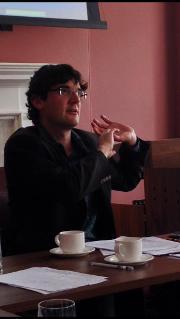This month we will be publishing a series of posts on the topic of fatigue. Two years after the outbreak of the Covid-19 pandemic, constant fatigue characterises the lives of too many of us. Here we think about some of the political and social consequences of fatigue. In this first post, Elisa Piras writes about the dangers of information overload.
I’m having trouble trying to sleep / I’m counting sheep but running out (…)
My eyes feel like they’re gonna bleed / Dried up and bulging out my skull / My mouth is dry, my face is numb (…)
My mind is set on overdrive / The clock is laughing in my face / A crooked spine, my senses dulled (…)
Green Day, Brain Stew (1995)

Egon Schiele: Sitzendes Mädchen mit herabgebeugtem Kopf, 1911
If there is a word for describing the continuous tension that we experience in our daily life because of our compulsive need of information, it is probably overload. In a large and hyperconnected world, we are at the same time information seekers, producers and transmitters: we are informative hubs, constantly sharing messages with other hubs, because of our work, education, leisure activities. Like Don Quixote, the average person spends way too many hours engrossed in intellectual activities, absorbing the most different notions, analysing a wide array of data, messaging with a number of interlocutors. Some of us do so while moving between different languages and crossing several networks. Unlike Don Quixote’s, the world we live in is not an imaginary or evanescent one; quite to the contrary, the information waves that we ride and that sometimes overwhelm us bring elements of reality to our attention and put a strain on our cognitive, communicative and social skills.
When reality becomes especially pressing – for instance, in particularly intense work periods, or when major media events, like a pandemics or an escalating war, unfold – we can experience a malaise that Wurman (1989) has described as information anxiety, the condition of stress caused by the perceived gap between data and knowledge, which we feel when we are not able to extract what we need or want from the available information. Analysing work-induced stress manifestations among managers, Lewis (1990) observed the existence of the so-called information fatigue syndrome, whose symptoms are psychophysical: unrest and irritability, anxiety and self-doubt, insomnia, confusion and frustration, forgetfulness, frequent stomach pains and headaches. Since our access to information is often physically mediated by screens or earphones/earbuds, these symptoms might be accompanied by those revealing technostress: brain fog, sore eyes, neck and spine pain.
Overwhelming waves of information cause the condition we know as information overload or infoxication, which “occurs when decision-makers face a level of information that is greater than their information processing capacity”; this situation causes a decisional paralysis (Roetzel 2019). Sure, the problem of obtaining and processing just the adequate amount of information which allows people to make good choices is not a new one. However, nowadays data smog and info-noise appear to be especially challenging, not only for managers, but for a wider group of people, including adolescents. Moreover, according to a recent report, 59.5% of the world population uses the Internet and the pandemic has boosted the number of social media users, which has reached 4.2 billion as of January 2021. Smart working, online teaching and learning, socialising in the metaverse – something that 30 years ago could be possible only in cyberpunk sci-fi novels – have become widespread activities during the last two years and the smartphone really is this age’s devotional object, as techno-apocalyptic philosopher Byung-Chul Han (2014) maintains.

Egon Schiele: Liegendes Mädchen mit roter Bluse
As a rich literature shows, our capacity to make decisions is hampered by information overload. Even under normal conditions, our decisions tend to be less rational and intelligible than we believe them to be, because of the characteristics of the problems at stake such as undecidability and/or of the so-called opacity of consciousness, i.e. the difficulty with grasping the cognitive processes behind our choices. This is especially so when we consider collective decisions which have to be adopted under conditions of information disorder. Rumours, i.e. false or manipulated information, contribute to make our collective decisional processes – in the family, at work, in political arenas – more complicated and make dialogue more difficult, fostering opinion polarisation and undermining the chances of reaching an agreement and developing mutual trust.
When information overload is not a momentary blackout but becomes a daily condition, our normality changes and we feel protracted fatigue and exhaustion. Writing, reading, listening, discussing become exhausting tasks and we feel like we are falling into a Green-Day-dystopia. We risk becoming prey to neuronal illnesses like depression and burnout syndrome. Information is the key to our societies and it helps us to shed light on reality, but as Byung-Chul Han (2015) warns us, its overly intense glow can blind us and eventually plunge us into darkness, turning us into insomniac and depressed hyperconnected yet socially isolated ghosts. Knowing that we are exposed to such a risk is the necessary precondition to start searching for viable solutions, alternative to the “heresy” of radically disconnecting ourselves from the digital world and choosing a life sheltered from the blinding light of information.
essay by Elisa Piras








